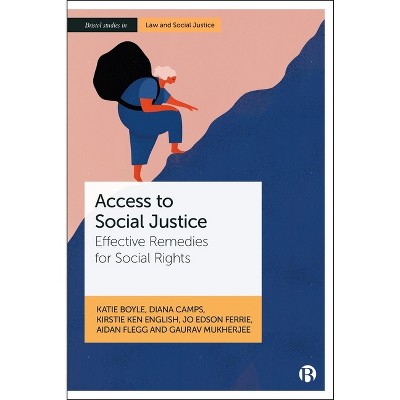#Humanrights - (Stanford Studies in Human Rights) by Ronald Niezen (Paperback)

About this item
Highlights
- Social justice and human rights movements are entering a new phase.
- About the Author: Ronald Niezen is the Katharine A. Pearson Chair in Civil Society and Public Policy in the Faculty of Law and in the Department of Anthropology at McGill University.
- 280 Pages
- Freedom + Security / Law Enforcement, Civil Rights
- Series Name: Stanford Studies in Human Rights
Description
About the Book
"Social justice claims, and the human rights movement in particular, are entering a new phase. Social media, algorithms, and artificial intelligence (AI) are reshaping the practices of advocacy and compliance. In this new era, technicians, lawmakers and advocates, sometimes in collaboration with the private sector, have increasingly gravitated toward the possibilities and dangers inherent in the non-human. Algorithms and automated data processing are unpredictable and opaque. The use of algorithms and artificial intelligence may be advancing the protection of human rights in some ways, but new technologically-enhanced forms of human rights abuse have emerged alongside these new protections. Ronald Niezen entreats readers not to be distracted by the shiny new innovations, and to instead consider how new tech interacts with the older models of rights claiming and communication, arguing that the key to understanding the new era of social justice is not in an exclusive focus on sophisticated, expert-driven forms of data management, but in considering how these technologies are interacting with other forms of communication to produce new avenues of expression, public sympathy, redress of grievances, and sources of the self. To do this, Niezen investigates various case studies of the pursuit of justice via technology, including Twitter-faciliated mobilizations, WhatsApp activist networks, and the news prioritization or "filter bubbles" fed through Google and Facebook algorithms to uncover how emerging technologies of data management and social media influence the ways that human rights claimants and their allies pursue justice, and the "new victimology" that prioritizes and represents strategic lives and types of violence over others"--Book Synopsis
Social justice and human rights movements are entering a new phase. Social media, artificial intelligence, and digital forensics are reshaping advocacy and compliance. Technicians, lawmakers, and advocates, sometimes in collaboration with the private sector, have increasingly gravitated toward the possibilities and dangers inherent in the nonhuman. #HumanRights examines how new technologies interact with older models of rights claiming and communication, influencing and reshaping the modern-day pursuit of justice.
Ronald Niezen argues that the impacts of information technologies on human rights are not found through an exclusive focus on sophisticated, expert-driven forms of data management but in considering how these technologies are interacting with other, "traditional" forms of media to produce new avenues of expression, public sympathy, redress of grievances, and sources of the self. Niezen considers various ways that the pursuit of justice is happening via new technologies, including crowdsourcing, social media-facilitated mobilizations (and enclosures), WhatsApp activist networks, and the selective attention of Google's search engine algorithm. He uncovers how emerging technologies of data management and social media influence the ways that human rights claimants and their allies pursue justice, and the "new victimology" that prioritizes and represents strategic lives and types of violence over others. #HumanRights paints a striking and important panoramic picture of the contest between authoritarianism and the new tools by which people attempt to leverage human rights and bring the powerful to account.
Review Quotes
"#HumanRights shines much-needed light on the use of digital information to illuminate human rights violations around the world. Ronald Niezen spotlights how human rights advocates' embrace of innovative methodologies is shifting the field of practice--to corroborate survivors' stories, verify contested facts, and ultimately contribute to the realization of justice."--Alexa Koenig "UC Berkeley School of Law"
"An insightful human rights analysis, intellectually rigorous and culturally nimble."--Kirkus Reviews
"No longer confined to the courts and clinical reports, the discourse of human rights is now claimed by activists marching in the streets, spray-painted on urban walls, and invoked to enroll participants and engage allies through social media. Ronald Niezen's groundbreaking and insightful book tracks the emergence of these new mediascapes and compellingly explains why they matter."--Stuart Kirsch "author of Engaged Anthropology: Politics beyond the Text"
"What is the connection between emerging information technologies and the rise of global human rights? Ronald Niezen addresses this question with imagination and acuity, exploring the extent to which their interplay portends a future of greater political domination, emancipatory potential, or a complex mix of both. A critical issue, and book, worthy of very close attention."--John and Jean Comaroff "Harvard University"
About the Author
Ronald Niezen is the Katharine A. Pearson Chair in Civil Society and Public Policy in the Faculty of Law and in the Department of Anthropology at McGill University.










